Tools and Resources for Advisors of First-Generation Medical School Students
Medical students who are the first in their families to graduate from college bring unique strengths to medical school.
They often possess a track record of highly desirable traits for a physician, such as grit, self-determination, and important insights into the complex health disparities facing the U.S health care system today.
These first-generation college graduates (FGCGs), and others who come from backgrounds with limited exposure to medicine, may also have unique needs and face challenges that are not always readily recognized by their schools.
For example, cultural capital (what one knows about the culture they are in) and social capital (who one has as their guide) may be in short supply for FGCG students, leaving them encumbered by invisible yet very real barriers that do not affect their continuing-generation counterparts.
Medical schools should consider how they provide academic support for FGCG students, from the point of application and acceptance to graduation and beyond. In addition, they should have access to intentional development opportunities and comprehensive support during clerkships and beyond.
Academic Support
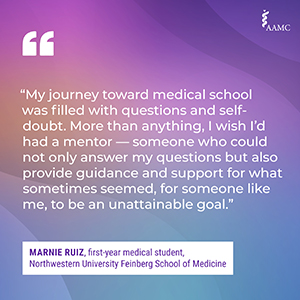
#1 Academic-Support Resource: Your School’s Office of Academic Affairs and Student Affairs
Knowing the programs that already exist on your campus is the first step. Potential resources available may include
- Pre-matriculation programs for students to enhance their skill sets and ensure their preparation for continued study. These programs can be especially helpful for students who were non-science majors or have been away from the academic environment for a period.
Many programs specify eligibility criteria, but any student interested in the program should contact the program director to express interest. Programs often include such topics as learning and study skills, time management, test-taking strategies, practice coursework, success strategies, and professional development workshops. Some services available:
- Academic coaches can regularly check in with students to understand their progress and address their personal development needs.
- Peer and group tutoring services can provide a format for individualized or group instruction, and more senior medical students, who have already gone through the curriculum, can offer tips.
- Upper-level students can often create drives of information to help all students with resources, questions, study tools, etc. Find out what resources are available.
- Learning-Specialist consultations may be available through your medical school or university. They can provide group instruction or individualized assistance with academic-success skills such as creating a study plan, test-taking strategies, exploring learning styles, and time management.
- Neuropsychological assessment may be beneficial for identifying a learning disorder or disability.
Other Resources
- Osmosis: Surviving and Thriving in the First Year of Medical School
- Osmosis: The Road to Residency
- Geisinger Commonwealth School of Medicine (GCSOM)
- Information about the First-Generation and Ally Student Support Committee and a wealth of online information for FGFC students and institutions trying to support students.
Learning-Environment Resources
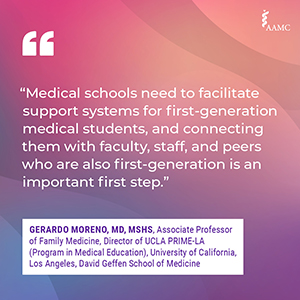
The learning climate/environment includes psychosocial (personal, social, organizational) and material (physical and virtual spaces) dimensions that affect learning, well-being, professional-identity formation, burnout, depression, and marginalization.
The complex components and interactions within the learning environment are critical to the success of medical students. Therefore, educators and institutions seeking to support FGCGs must make the learning environment a priority.
Assessments
None of these assessments address FGCG-student perceptions specifically. However, assessing the learning environment and/or institutional culture is an important step toward nurturing an environment where everyone feels welcome.
Furthermore, if an institution chooses to assess perceptions of FGCG students, a demographic question could be added to an assessment instrument to obtain that subgroup data.
- C-Change Faculty, Resident, and Student Surveys
- Standpoint™ Faculty Surveys
- AAMC Year Two (Y2Q) Questionnaire
- AAMC Graduation Questionnaire
- Mayo Well-Being Index
- Dundee Ready Educational Environment Measure (DREEM)
- Clinical Learning Environment Review (CLER) (GME focused)
- Johns Hopkins Learning Environment Scale
- The Educational Climate Inventory
Workshops/Training Programs
In developing interventions to improve the learning environment, individuals may want to consider collaborating with departments within the institution and/or university who may have expertise, such as a center for teaching and learning, teaching academy, or office responsible for equal opportunity matters. Below are institutions doing exemplary work in this area.
Yale School of Medicine
(Contact: Mytien Nguyen, MSc)
Changing the curriculum to improve the learning environment
- Health equity core curriculum
- U.S. Health Justice Collaborative and an elective preclinical course that focus on health-access, fairness, and the socioeconomic determinants of health
- Four-part workshop on the fundamentals of teaching in such a way that everyone feels included and respected, and that provides teaching strategies that consider diverse backgrounds, how to create an equal opportunity environment, and how hidden curriculum (unwritten lessons informally taught but not part of the formal curriculum) influences students’ learning and participation
- Workshop on teaching FGCG and nontraditional students, in partnership with the Yale Poorvu Center for Teaching and Learning
University of South Carolina School of Medicine Greenville
(Contact: Julie Linton, MD)
The Student Advocates for Diversity, Inclusion, and Equity (SADIE)
- SADIE is a body of welcoming students, faculty, and staff committed to advancing the integration of a broad range of backgrounds and perspectives and ensuring everyone feels included within the context of the medical school’s curriculum; supporting those student organizations with an emphasis on these values; and fostering an environment for meaningful discussions centered on equal opportunity issues at the School of Medicine.
- The students on this committee serve as support for medical students of any race, creed, ethnic background, ability, sexual orientation, or gender identity, so they can express themselves in a safe and informed setting.
Other possible steps/initiatives for medical schools:
- Create a contact sheet of FGCG faculty and senior students willing to serve as advisors/mentors to more junior students.
- Hold student workshops (finding a research mentor, managing loans, building a CV) that are developed with the particular needs of FGCG students in mind.
- Train faculty/staff providing student academic support about the challenges faced by FGCGs, and encourage dialogue with students about barriers or stresses outside of school that may be contributing to academic issues.
- Please see the many examples and recommendations in other sections of this toolkit that also impact the learning environment.
Professional Development and Career Mentorship
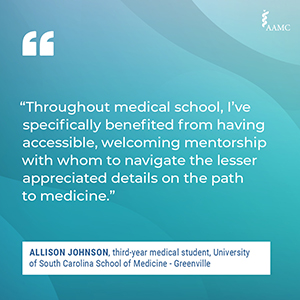
It is especially important that FGCG medical students have access to career-mentorship relationships. With quality career-mentorship relationships, FGCG students gain traction and knowledge to assist in lifelong learning and success as physicians.
Institution-Based Initiatives
Geisinger Commonwealth School of Medicine (GCSOM)
To learn more about the GCSOM first-generation initiatives, please contact Vicki T. Sapp, PhD, the First-Generation and Ally Student Support Committee founder and chair.
- First-Generation Celebration of Achievement Subcommittee is charged with hosting and implementing initiatives to celebrate FGCG students during the Saturday prior to the commencement-award-recognition day of events, at the conclusion of their time at GCSOM. Subcommittee chair: Vicki T. Sapp, PhD.
- First-Generation National Day of Celebration Subcommittee is charged with hosting and implementing initiatives to celebrate FGCG students. Additionally, the subcommittee works collaboratively with community-based organizations and the GCSOM community to develop initiatives produce marketing materials, and maintain awareness of the needs of these students, honoring them during this annual national day of celebration. The subcommittee also registers all events online with the national organization, FirstGen Forward, to provide a national footprint for GCSOM. Subcommittee chair: Amy Kline, MA.
- First-Generation Meet and Greet Subcommittee is charged with hosting and implementing initiatives to welcome new FGCG students to the GCSOM family at the beginning of each year. Additionally, the subcommittee works collaboratively with community-based organizations and GCSOM to develop initiatives, produce marketing materials, and maintain awareness of the needs of these students, including welcoming them to the area. Subcommittee chair: Justin Collins, MA.
- Food Pantry Subcommittee is charged with monitoring and collecting food donations for the GCSOM Food Pantry. Employee automatic payroll contributions, private donors, and local grocery store chains’ monthly donations have been key to GCSOM’s ability to address students’ food insecurities. Subcommittee cochairs: Amy Kline, MA, and Anna Arvay, MBA.
- First Mentorship Group Subcommittee is charged with hosting and implementing initiatives to bring students together for events, meetings, and open dialogue to address concerns and issues as they relate to impostor syndrome, stereotype threat (when an individual fears confirming a negative stereotype about their group), racial battle fatigue, isolation, and alienation. Subcommittee chair: Stanley Kania, PhD.
Stanford Medicine | 1st Generation Mentorship Program
The 1st Generation Mentorship Program is a community of Stanford Medicine students, faculty, alumni, and staff who are the first in their family to attend college/graduate/professional school and/or are the first in their family born in the United States. Our goal is to provide FGCG students with broadened academic and professional networking opportunities and advocacy through continued mentorship.
UCLA David Geffen School of Medicine | First Gen Families Program
UCLA medical school First Gen student leadership and the office responsible for equal opportunity matters at the UCLA DGSOM created the First Gen families program, in 2018. These small groups (or “families”), each with a combination of five to 10 DGSOM First Gen faculty, students, residents/fellows, and staff, meet on an informal and personal basis (for coffee, dinners), with DGSOM funding support.
Michigan Medicine | First in Family
This multi-mentorship program offers support through specialty-specific pipeline programs (e.g., surgery, ophthalmology, and urology), faculty mentors, and mentorship families, which include residents and medical students. These efforts allow FGCG students to find a successful fit in their mentorship relationships, meet mentors in different stages of their careers, and leverage the benefits of team mentorship.
Emotional Support
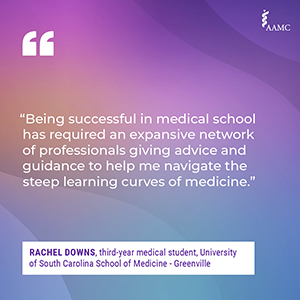
For students from backgrounds that are traditionally underrepresented in higher education, including FGCG students, persistent negative stereotypes and underrepresentation can lead to uncertainty about feeling included and connected with others, especially when faced with challenges or setbacks.
In medicine, there is considerable stigma associated with first-generation status, which can cause students to choose to remain invisible. Once they identify, their first-generation background can be viewed as a deficit rather than a strength.
In addition, FGCG students often have responsibilities at home and frequently worry about the families they leave behind. Many FGCG students may also struggle with what has been described as breakaway guilt. They may feel like they’re abandoning parents or siblings who depend on them.
Therefore, when it comes to academic aspirations and achievement, FGCG students may have more anxiety than other students due to impostor syndrome and the stereotype threat phenomenon. Moreover, navigating anxiety can exacerbate feelings of isolation and loneliness for first-generation students in medical school.
#1: Your Office of Student Affairs
The office may organize events that focus on empowerment.
Transition: Starting at White Coat Ceremony (or even during interviews), it is important to publicly recognize that FGCGs are underrepresented in medicine. If possible, have a point person or office that FGCG students can go to for support. A positive transition to medical school is key to student well-being. Administrators should work with advisors to organize sessions and workshops for FGCG students on topics such as adjustment to medical school and the medical profession, cultural capital, and hidden curriculum. In addition, schools should track and identify FGCG students, and student affairs administrators should have ongoing meetings with these students.
Recognition and visibility: Some schools distribute “First Gen” or “I’m First!” lapel pins, to recognize and honor the accomplishments of FGCG students. Some schools encourage faculty and other mentors to identify as FGCG, to help create a welcoming environment in which current students will feel comfortable identifying as FGCGs as well.
Focus on assets: FGCG students have many characteristics that are desired in a physician, including proactivity, being goal-oriented, optimism, humanism, and reflexivity. However, FGCG students are also not likely to have this perspective about themselves. Administrators and advisors should facilitate a shifting of perspectives both from the student and within the learning and social environment. An environment that values the unique assets that FGCG students bring to medicine will enable them to further develop their strengths and socio-emotional sense of being part of medicine.
Impostor syndrome discussion group: This will facilitate a way for FGCG students to have a direct confrontation with the concept of impostor syndrome. It’s a means of empowering them to understand their feelings and to encourage asset-based coping strategies as a proactive approach. Shifting to an asset-based lens, where the inherent strengths, talents, and abilities of students are identified and utilized, instills students with a sense of pride and confidence, empowering them to seek support without stigma and increasing their awareness of the tools they possess to navigate struggles both academic and social/emotional.
Panels: Through in-person meetups, events, and social media, students find opportunities to connect socially with others from similar backgrounds, express challenges and strengths related to being a first-generation or low-income college student, and seek guidance from older first-generation and low-income students and alumni. All the work is grounded in an understanding of psychological interventions, such as difference education, reducing stereotype threat, and values affirmation.
Discussion series: Partnerships between counseling services and the medical school may organize a discussion series specifically focused on FGCGs. Learning occurs through dialogue and discussion on topics such as the intersectionality of different identities (e.g., race, ethnicity, gender, socioeconomic status, etc.) and how these identities affect the training experience. Students are encouraged to discover new strengths and the potential to thrive during medical school training. In addition, they are encouraged to learn more about resources on campus that are integral to any student’s success.
#2: Access to Psychological Counseling and Wellness Programs
Access to psychological counseling and wellness programs is critical for the emotional health of FGCG students. Students should be able to access counselors who understand the FGCG experience. Plus, schools should aim to destigmatize mental health. This could be done through intentional peer mentorship with upper-class FGCG students.
Specific examples from medical schools:
- Geisinger Commonwealth School of Medicine: Student Health Services fully covers unlimited sessions with an on-site licensed social worker and/or behavioral health specialist. Students also have access to five sessions with a highly trained clinician from the Employee Assistance Program (EAP). Additionally, GCSOM has a health and wellness committee that coordinates a bi-monthly health and wellness series. GCSOM has weekly yoga, meditation, and mindfulness workshops too.
- Yale School of Medicine: The Yale Health plan fully covers one counseling session per week for all medical students, with a psychiatrist of their choosing within the network. Students can request a psychiatrist who matches their race/ethnicity, gender, or other demographic factors.
- Southern Illinois University School of Medicine: Its Center for Human and Organizational Potential emphasizes personal and emotional well-being.
- Kaiser Permanente School of Medicine: It plans to include regular behavioral health visits for all students.
Financial Support
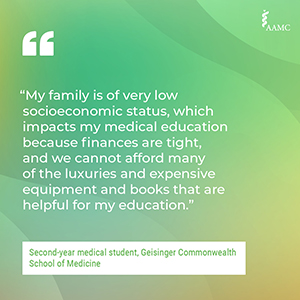
Navigating the financial aspect of medical school is challenging. For students who are the first in their family to graduate from college, the challenge can be even more daunting. In fact, data show that FGCG students and their families typically have less information about how to apply for financial assistance and vastly underestimate how much aid is available.
Tips to keep in mind when advising first-gen and low-income learners on navigating the financial aspects of medical training:
- Realistically, many FGCG students rely on financial aid to cover expenses for their family. Noting this reality and being empathetic can help build trust between advisors and students.
- If possible, encourage students to start medical school with no outstanding credit card debt and other personal noneducational debt.
- Create a budget and stick to it. The AAMC’s financial wellness site is a great place to learn how to budget.
- Federal education loans are eligible for deferment while you are attending medical school on at least a half-time basis. If you have obtained nonfederal educational loans, you should contact your loan servicer to determine if those loans are eligible for deferment while you are in medical school.
- A word of caution: Be sure to read the fine print before obtaining private loans. These loans may not be consolidated with federal loans, so they are not eligible for federal loan forgiveness. The AAMC Education Debt Manager can show you other pitfalls of private loans.
- Reach out to your financial ad office team. They are there to help.
Family considerations: Best practices
Some trainees, particularly FGCG trainees, have been able to help financially support their extended and/or immediate families. Partnered and/or parenting medical trainees have other specific financial considerations. It is difficult for medical students to hold a job to help support a family. A student’s cost of attendance (COA) is meant to cover the needs of the student and includes the costs for tuition, fees, room and board, transportation, books, supplies, required computer, loan fees, and, if applicable, dependent-child care costs. If you have dependent-child care needs, check to see if your campus offers reduced-cost childcare. If you have childcare costs or costs related to a disability, contact your financial aid office to learn its process for including these costs in your COA.
Family Connection and Engagement
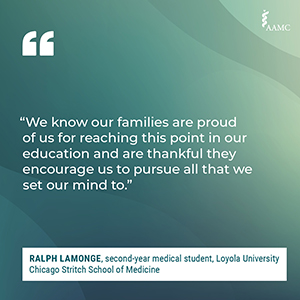
In most instances, parents want to be involved and want to be supportive of their children during medical school. However they are often unsure about what level of involvement is appropriate and what advice to provide. Importantly, research on first generation undergraduate students has shown that family support can significantly impact students’ academic outcomes. Therefore, it is critical that medical schools not only involve parents in the medical training of its FGCG students but also equip first-generation parents with the information and tools to best support their children.
Anecdotally, we have found that many students benefit from high levels of support from their families. On the other hand, we have found that a proportion of parents of FGCG students view the pursuit of higher education as a long and wasted investment (i.e., student loans and many years of financial security deferred). In addition, many FGCG students have responsibilities at home (social, emotional, and financial) and continue to care for family members while also being full-time medical students.
We hope that providing these resources will allow family members to be more engaged and understanding, and feel equipped to support their student in a multitude of ways. Furthermore, by including the family, institutions convey their understanding that families are a key part of the first-gen medical school journey and of their student’s future success.
Examples of Connecting Families of FGCG Students to the Institution
One of the keys to retaining FGCG students is also to make the family feel welcome on the medical campus. It is important to engage the loved ones of students as partners in their success and to help both the student and the family through this transition. Some strategies include creating activities that help to bridge cultural gaps, sending invitations to campus activities, and giving students tools for communicating about their medical training.
MyMDtoBe
An online tool, this keeps family members informed about the medical student’s stage of training.
UC Davis School of Medicine
Materials for incoming medical student families
- Spanish version (PDF)
- English version (PDF)
UCLA David Geffen School of Medicine
The school organizes an orientation luncheon with parents of FGCG students. The welcome lunch and meeting take place on the day of the White Coat Ceremony, when many family members of incoming medical students are already on campus. The goal is to create a sense of community for the family members of incoming medical students who were the first in their families to graduate from college, and to make family members feel included in the UCLA space.
Yale School of Medicine
The school provides financial assistance for up to two family members (broadly defined) to attend the White Coat Ceremony. In a White Coat survey that is sent to all incoming students, if a student indicates that no family member will be attending the White Coat Ceremony, the student is asked whether it is due to financial constraints. If so, the admissions office then reaches out to the student to offer financial assistance for up to two family members to attend the White Coat Ceremony.
Other initiatives/ideas that can support first-Gen parents in their efforts to support their children*
- Assign a family-support administrator as a point person between family members and the medical school.
- Provide a list of advice to first-gen parents and families, including changes in family structures.
- Generate a list, by polling current FGCG medical students, of “Things I wish my family would know.”
- Organize and support a parent community group (or association) that meets and learns about the medical school process and how to support their student.
*Brainstormed by FGLIMed, the national First Gen and Low Income in Medicine Association.
Please note: This toolkit is not intended to endorse expressed views, products, or services offered on these sites or in these documents. Availability of resources may change over time. To suggest edits or updates to this page, please contact educationalaffairs@aamc.org.
Authors
- Carina Abreu, MD Candidate, Class of 2022, Albany Medical College
- Jacob M. Altholz, Medical Student and OSR Representative, Uniformed Services University of the Health Sciences
- April O. Buchanan, MD, Associate Dean for Curriculum and Professor of Pediatrics, University of South Carolina School of Medicine Greenville
- Alejandra Casillas MD, MSHS, Assistant Professor of Medicine in Residence, UCLA First Gen Advisory Board, First Gen Med Faculty Advisor, David Geffen School of Medicine at UCLA
- Michele Cerasani, MD Candidate, Class of 2022, Albany Medical College
- Lisa Coplit, MD, Associate Dean for Faculty Development, Frank H. Netter MD School of Medicine at Quinnipiac University
- Conroy Green, Associate Director of Financial Aid, Albany Medical College
- Ann Loughman, Director of Financial Affairs, Albany Medical College
- Hyacinth R. C. Mason, PhD, MPH, CHES, Associate Professor and Assistant Dean, Student Support and Inclusion, Albany Medical College
- Mytien Nguyen, MSc, MD/PhD Student, Yale School of Medicine
- Enxhi Rrapi, MD Candidate, Class of 2023, Albany Medical College
- Vicki T. Sapp, PhD, Assistant Professor and Director, Student Engagement, Diversity and Inclusion, Geisinger Commonwealth School of Medicine
- Toshiko Uchida, MD, Associate Professor of Medicine and Medical Education, Northwestern University Feinberg School of Medicine
Working Group Members
- Jacob M. Altholz, Medical Student and OSR Representative, Uniformed Services University of the Health Sciences
- April O. Buchanan, MD, Associate Dean for Curriculum and Professor of Pediatrics, University of South Carolina School of Medicine Greenville
- Alejandra Casillas, MD, MSHS, Assistant Professor of Medicine in Residence, First Gen Advisory Board, First Gen Med Faculty Advisor, David Geffen School of Medicine at UCLA
- Lisa Coplit, MD, Associate Dean for Faculty Development, Frank H. Netter School of Medicine at Quinnipiac University
- Abraham Gallegos, MD, NIH National Research Services Award Research Fellow and Clinical Instructor, Pediatrics, David Geffen School of Medicine at UCLA
- Hyacinth R. C. Mason, PhD, MPH, CHES, Associate Professor and Assistant Dean, Student Support and Inclusion, Albany Medical College
- Christopher McKnight, Program Specialist for the Medical Education Division, AAMC
- Mytien Nguyen, MSc, MD/PhD Student and FGLIMed Founding President, Yale School of Medicine
- Vicki T. Sapp, PhD, Assistant Professor and Director, Student Engagement, Diversity and Inclusion, Geisinger Commonwealth School of Medicine
- Toshi Uchida, MD, FACP, Chair, Associate Professor and Leader of Clinical Medicine Element, Northwestern University Feinberg School of Medicine
Thank you to our reviewers: Meredith Bazemore, Director, Office of Rural Initiatives, University of North Carolina School of Medicine; Dr. Rebecca Dougherty, Codirector, Advanced Clinical Experience, Donald and Barbara Zucker School of Medicine at Hofstra/Northwell; Dr. Sara Hughes, Associate Dean of Education and Student Affairs, UCSF School of Dentistry; Rafaella Faria, First Year Medical Student, University of North Carolina School of Medicine; Dr. Priti Mishall, Associate Professor of Anatomy and Structural Biology and Ophthalmology and Visual Sciences, Albert Einstein College of Medicine; Dr. Sharon Younkin, Chief of Staff for Medical Education, David Geffen School of Medicine at UCLA; Dr. Doreen Olvet, Assistant Professor, Department of Science Education, Donald and Barbara Zucker School of Medicine at Hofstra/Northwell; Dr. Deepan Singh, Associate Dean of Students and Diversity, NYU Grossman Long Island School of Medicine; Dr. Jordan Holmes, Assistant Professor of Radiation Oncology, Indiana University School of Medicine; Katina Kassicieh, Third Year Medical Student, University of New Mexico School of Medicine; Dr. Steven Shelov, Dean and Professor of Pediatrics, NYU Grossman Long Island School of Medicine; Dr. Kema Gadson, Assistant Dean for Student Affairs and Diversity, Florida State University College of Medicine; and Dr. Marilyn Katz, Director of Academic and Educational Affairs, University of Connecticut School of Medicine. We thank our reviewers for their insight and helpful comments on earlier versions of this toolkit.